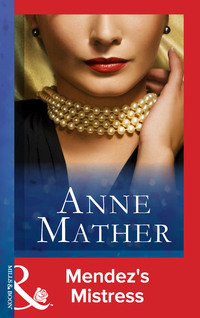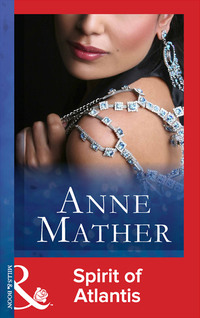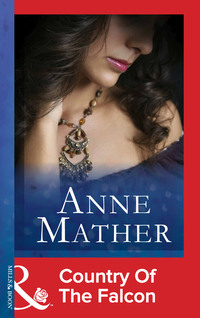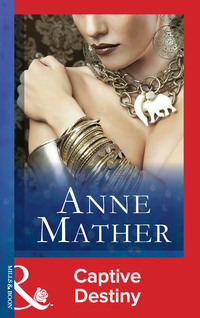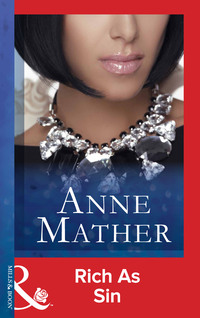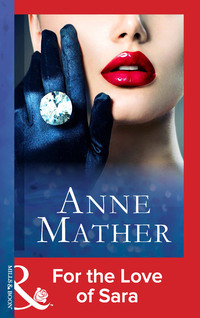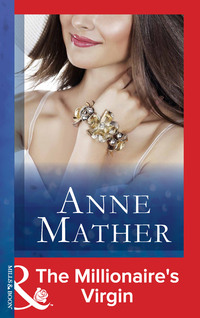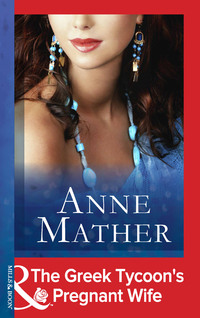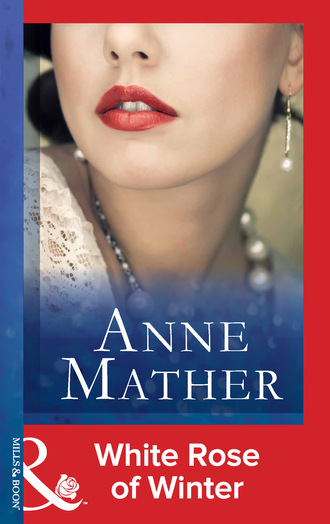
Полная версия
White Rose Of Winter


Mills & Boon is proud to present a fabulous collection of fantastic novels by bestselling, much loved author
ANNE MATHER
Anne has a stellar record of achievement within the
publishing industry, having written over one hundred
and sixty books, with worldwide sales of more than
forty-eight MILLION copies in multiple languages.
This amazing collection of classic stories offers a chance
for readers to recapture the pleasure Anne’s powerful,
passionate writing has given.
We are sure you will love them all!
I’ve always wanted to write—which is not to say I’ve always wanted to be a professional writer. On the contrary, for years I only wrote for my own pleasure and it wasn’t until my husband suggested sending one of my stories to a publisher that we put several publishers’ names into a hat and pulled one out. The rest, as they say, is history. And now, one hundred and sixty-two books later, I’m literally—excuse the pun—staggered by what’s happened.
I had written all through my infant and junior years and on into my teens, the stories changing from children’s adventures to torrid gypsy passions. My mother used to gather these manuscripts up from time to time, when my bedroom became too untidy, and dispose of them! In those days, I used not to finish any of the stories and Caroline, my first published novel, was the first I’d ever completed. I was newly married then and my daughter was just a baby, and it was quite a job juggling my household chores and scribbling away in exercise books every chance I got. Not very professional, as you can imagine, but that’s the way it was.
These days, I have a bit more time to devote to my work, but that first love of writing has never changed. I can’t imagine not having a current book on the typewriter—yes, it’s my husband who transcribes everything on to the computer. He’s my partner in both life and work and I depend on his good sense more than I care to admit.
We have two grown-up children, a son and a daughter, and two almost grown-up grandchildren, Abi and Ben. My e-mail address is mystic-am@msn.com and I’d be happy to hear from any of my wonderful readers.
White Rose of Winter
Anne Mather

www.millsandboon.co.uk
MILLS & BOON
Before you start reading, why not sign up?
Thank you for downloading this Mills & Boon book. If you want to hear about exclusive discounts, special offers and competitions, sign up to our email newsletter today!
SIGN ME UP!
Or simply visit
signup.millsandboon.co.uk
Mills & Boon emails are completely free to receive and you can unsubscribe at any time via the link in any email we send you.
Table of Contents
Cover
About the Author
Title Page
CHAPTER ONE
CHAPTER TWO
CHAPTER THREE
CHAPTER FOUR
CHAPTER FIVE
CHAPTER SIX
CHAPTER SEVEN
CHAPTER EIGHT
CHAPTER NINE
CHAPTER TEN
CHAPTER ELEVEN
Copyright
CHAPTER ONE
LONDON AIRPORT seemed drab and miserable after the colour and vitality of Kuala Lumpur, its illuminated buildings sheltering in a mist of fine rain. There were no exotically patterned cheongsams here, not even the tantalizing glimpse of a songbok among the throng of people bustling towards waiting relatives and friends. It was as cold and alien as Malaysia had seemed six years before, thought Julie unhappily, hunching her slim shoulders beneath the soft sable coat which she had bought on Barbara’s advice for the homeward journey.
And yet London no longer looked like home. Home was a single-storied dwelling on the shores of the South China Sea, and although when she had first seen it she had thought she was going to hate living there, hate everything about her new life, in fact, time and affection had served to make it the reality and her life in London merely the hopefully forgotten past.
But now she was back in England again, and somehow she had to accept that the bungalow outside of Rhatoon was no longer the refuge it had become. It was up to her to adapt to her changed circumstances quickly so that Emma should not find it all too painful.
An attractive stewardess was urging her passengers forward towards the Customs and clearance buildings, smiling as she bade some of them farewell, saving a particularly warm expression for the small girl holding Julie’s hand.
‘Good-bye, Emma,’ she said, bending down to take her hand. ‘And thank you for your assistance during the flight. I don’t know how we should have managed without you.’
Emma glanced mischievously up at Julie, her grey eyes dancing. Then she looked back at the stewardess. ‘Did I really help? Mummy said I was probably more nuisance than I was worth.’
The stewardess’s smile widened. ‘On the contrary. Who else would have handed out all those magazines, if you hadn’t been around?’
Julie’s lips turned up at the comers. ‘It was kind of you to let her help,’ she said. ‘It made the journey so much less arduous for her.’
The stewardess made a deprecatory gesture. ‘That’s all right, Mrs. Pemberton. We enjoyed her company.’
‘Well, thank you again.’ Julie bit her lip. ‘Say good-bye now, darling. We shan’t be seeing Miss Forrest again.’
‘G’bye, Miss Forrest,’ responded Emma politely, and Julie smiled before walking on.
The stewardess had been kind, but then most people were kind to Emma. She was one of those children that attracted attention wherever she went. It wasn’t that she was a particularly rosy-cheeked individual; on the contrary, her skin was pale and did not respond to sunlight, and her hair was black and completely straight, yet for all that she possessed that certain something that singled her out from the ordinary. In the beginning, this knowledge had caused Julie no little anxiety, but as time went by she realized it was simply a family resemblance and not something that belonged exclusively to Emma’s father.
Their luggage was being cleared, their passports checked; everyone was so friendly and polite to the attractive young woman who was travelling with only her five-year-old daughter as companion. But beyond the glass partitioning a throng of people were waiting impatiently and Julie hugged her coat closer about her suddenly, feeling cold and apprehensive. She avoided looking in that direction. Somehow she wanted to delay the moment when she must take up contact again with Michael’s family, and only when Emma tugged her hand and demanded excitedly: ‘Where’s Grandma? Can you see her, Mummy?’ did she cast a cursory glance towards the reception lounge.
‘Not yet, darling,’ she murmured faintly, glancing round to ascertain that their cases were all together. Most of their heavier luggage had gone by sea, in trunks, but they had a couple of cases with them containing necessary changes of clothing.
‘But you did say that Grandma was coming to meet us, didn’t you, Mummy?’ Emma asked persistently. ‘I ‘spect she’s waiting with those other people, don’t you?’
‘I expect so, darling.’ Julie heaved a deep breath. ‘Come along. We’ll go and see.’
Disdaining the use of a porter, Julie picked up a case in each hand and directing Emma to carry her airline bag they emerged into the reception area. Lucy Pemberton, Michael’s mother, had said she would meet them at the airport, but she was notoriously unreliable and Julie was not surprised to find no sign of her. She sighed. Were she not feeling so hollow already. Lucy’s non-appearance to meet the daughter-in-law she had not seen for almost six years might have aroused a distinctly unpleasant ache in the region of her heart, but the events of the past three months had been so traumatic anyway, she felt almost empty of emotion.
Only Emma’s small face drooped with disappointment. ‘She’s not here!’ she announced indignantly. ‘Oh, Mummy, why? Why isn’t she here like she said she would be?’
Julie bent to the child, putting down the cases with a sigh. ‘Don’t upset yourself, darling. Grandma is probably on her way at this very moment. But you don’t know what it’s like here. The traffic is very busy! And she’s most likely been caught in a traffic jam. You know what they are now, don’t you?’
Emma sniffed. ‘I s’pose so. But why didn’t she set out quickly enough to be here to meet us?’ Emma was a very logical child.
Julie shook her head, straightening. ‘I don’t know, darling.’ She glanced surreptitiously at the broad masculine watch on her slim wrist. The plane had landed only a few minutes behind schedule. Lucy should have been here. ‘How would you like to go into the restaurant and have a Coke?’ she suggested. ‘Just until Grandma arrives? In fact I could see if I could telephone her from the restaurant.’
Emma frowned. ‘Won’t we miss her, though? I mean – if she arrives just after we’ve gone into the restaurant?’
Julie sighed again. ‘No. Look, if we sit near the windows we’ll be able to see everyone coming and going.’
Emma was unconvinced and Julie felt impatient suddenly. It should not have been too much to ask that Lucy should be here on time just this once. Particularly after the thousands of miles they had travelled. Didn’t she realize that after such a flight one was tired and disorientated, unable to cope with the usual upsets with the same degree of calmness?
A thought struck her. What if Lucy had forgotten altogether? It was not impossible. If it was her bridge afternoon, or her golf afternoon; (did people play golf in the rain?) or even one of those charity whist drives she loved to organize, it was quite possible that their arrival should pass unnoticed.
And after all, she had never liked Julie. She had shown that quite plainly. The very last thing she had wanted was for her to marry one of her beloved sons, and when that happened Michael had made things easier by taking the appointment in Rhatoon.
There was always Emma, of course. Three years ago when Michael had brought the child to England, he had said that his mother had doted on the child, but perhaps things would be different now that Julie was here. And Michael was dead …
‘Well, we can’t stay here,’ Julie said now, trying to sound competent and reasonable. ‘Come along, darling. I could do with a cup of tea myself.’
‘Julie!’
The hard masculine tones brought Julie up short and she turned reluctantly to face the man who had spoken. Even before she turned she knew exactly who it was, and her nerves jerked with exhaustion. Now was not the moment to confront Robert Pemberton, not when she was tired and uneasy and absurdly vulnerable, even after all this time.
Tall and lean, with hair as dark and straight as Emma’s brushing the collar of his expensively casual cream suede suit, he looked sleek and powerful, and compellingly sure of himself. He was not a handsome man, neither of the Pembertons had been that, but like Emma he possessed that elusive element of charm, and consequently he had always made other men, more strictly handsome men, seem insipid by comparison. He did not seem to have changed at all, except perhaps that his eyes were more deeply set in a face that wore a year-round tan due to the countless trips abroad he was able to make, and his expression did nothing to aid her failing confidence. Indeed, if anything he was regarding her with faint contempt and his lips twisted wryly as she held out a rather unsteady hand.
‘Hello, Robert,’ she managed. ‘How are you?’
He shook her hand briefly, his own cool and detached, his gaze flickering over her with painful appraisal. He had always had the knack of being able to reduce her to embarrassment by the directness of his stare, but on this occasion she endeavoured to hide her confusion, forcing herself to the knowledge that she was no longer a girl, no longer in his employ; she was a woman who had been married and widowed, with a five-year-old daughter. She must not think of all that had gone before. That was in the past. She must live for the present and think only of the future. Emma’s future.
Now Robert dropped her hand and said coolly, ‘I’m fine, thank you. And you?’ It was a formality, nothing more.
‘Fine. Fine.’ Julie assumed a mask of composure, hiding behind it like a fugitive fleeing from justice. Whenever she was emotionally disturbed she tried to do this, knowing that to an outsider she must appear cold and indifferent when this definitely was not the case.
Robert regarded her broodingly for a long moment, and she thought he was about to mention Michael, but then he dropped to his haunches beside the child. ‘Hello, Emma,’ he said. ‘Remember me?’
Emma stared at him consideringly. ‘No – o,’ she replied honestly. ‘But you look a little bit like Daddy, so I s’pose you must be Uncle Robert.’
‘That’s right.’ Robert smiled, the coldness which had been evident in his manner when he was speaking to Julie disappearing beneath Emma’s innocent charm. ‘Who told you I looked like Daddy?’
‘Mummy told me.’ Emma glanced up at Julie for a moment. ‘Didn’t you?’
Julie made an involuntary gesture, but Robert’s eyes never left the child’s face. ‘I see. And do I rate a kiss?’
Emma hesitated. ‘All right,’ she agreed, and leaning forward touched his cheek with her soft lips. She wrinkled her nose when it was over. ‘But why were you so late? And where’s Grandma? Mummy said she was coming to meet us. Where is she?’
Robert straightened, and looking round beckoned a porter to come and take their cases. Then he looked down and said: ‘Grandma couldn’t come. She’s not feeling well.’
Julie glanced at him quickly, sensing a rebuke, but he was not looking at her. He was talking to the porter, indicating the luggage, pointing outside to where his car was waiting. He had the supreme self-confidence that comes from always being used to giving orders, and Julie felt a fleeting irritation that he should so arrogantly take charge of the situation without offering any explanations, without even telling her where his mother was or why she should not be feeling well.
Now he turned. ‘Let’s go,’ he said, to no one in particular. ‘My car’s this way. We can talk on the way to town.’
Emma slipped her hand into Julie’s again, drawing her mother’s attention to herself. ‘Is it all right?’ she whispered. Emma’s whispers were all of the stage variety, and Robert could not fail to have heard her.
‘I expect so,’ replied Julie, managing a slight smile. ‘Come on. We’ll soon be able to have a bath and change our clothes. And those eyes look very tired, young lady.’
Emma smiled. ‘It’s exciting, though, isn’t it?’ she breathed. ‘I mean – we are here, aren’t we? In London. Do you think Grandma will be better by tomorrow?’
Julie shook her head. ‘I have no idea,’ she answered shortly, and was conscious of a faint reaction from the man ahead of them. He seemed to hesitate, as though he was about to say something more, but then he went on, his broad shoulders blocking Julie’s vision until they reached the swing doors and he stood aside politely to allow her to precede him.
Robert’s car was a pale grey Aston Martin, sleek and powerful, like the man himself. Six years ago, Julie reflected, he had driven an E-type Jaguar, but perhaps his tastes had changed since then. The porter stowed their cases in the boot of the car, and straightened to thank Robert enthusiastically for the tip he received. Robert seemed indifferent to the man’s gratitude, his face expressionless as he held open the passenger door for Julie to get in. Emma clambered into the back, bouncing up and down on the seat.
‘Isn’t it a super car?’ she exclaimed, her annoyance at the non-appearance of her grandmother vanishing in the excitement of the moment.
‘Super,’ echoed Julie, a trifle dryly, giving her small daughter a smile before hunching her shoulders in the soft fur coat.
Robert came to get in beside her, slamming his door and flicking the ignition with impatient precision. His thigh was only a few inches away from hers, and she had only to move her leg slightly to encounter his, and the realization brought back a flood of recollections she had forced herself to believe were forgotten. But was anything truly forgotten? she asked herself. Was it not more accurate to say that the mind could shed veils over things one wanted to forget, and until those veils were tom aside one could delude oneself into believing anything?
Robert turned on the screen wipers as they moved out of the parking area into the stream of traffic making for the city. The rain wasn’t heavy, but it was grey and dismal, causing the cars to use their lights even though it was only the middle of the afternoon. To Emma, it was all curiously new and exciting, but Julie shivered. She knew how cold and miserable London could seem in November.
Robert was an expert driver, his long-fingered hands sliding smoothly round the wheel, his eyes intent on the road ahead. However, as the traffic thinned on the motorway, he said: ‘There are some cigarettes in the glove compartment, if you’d like one.’
Julie shook her head. ‘I seldom smoke,’ she replied politely. Then, for Emma’s sake, she went on: ‘I hope your mother’s not seriously ill.’
Robert flicked a glance in her direction. ‘A cold, nothing more.’
‘I see,’ Julie linked her fingers together in her lap.
‘Where are you taking us, Uncle Robert?’ Emma asked, her arms resting on the backs of their seats. It was the question Julie had wanted to ask since Robert met them at the airport, but had been unable to voice.
Robert swung past a lumbering wagon before replying. Then he said casually: ‘We’re going into the city, Emma. I live there. I have an apartment. Would you like to see it?’
Julie looked swiftly at him. ‘Where’s your mother?’
Robert’s expression hardened. ‘Don’t alarm yourself, Julie. She’ll be there waiting for us.’
‘I’m not alarmed!’ Julie couldn’t prevent the sharpness of the retort. She hated this feeling of tension he was deliberately creating, and although Emma could not be aware of it, she resented it.
‘You mean Grandma is waiting for us at your apartment?’ cried Emma excitedly.
‘That’s right. She’s longing to see you again.’
Robert’s tone was entirely different when he spoke to Emma. And well it might be, thought Julie dryly. After all, she could hardly expect Robert to welcome her warmly after everything that had happened. But perhaps outright anger would have been better to cope with than this curt civility that was so chilling, so cold-blooded …
‘Your mother lives with you, then?’ Julie ventured at last. She had to ask.
Robert shook his head. ‘No. She doesn’t live in Richmond any more, as you possibly know, but she has an apartment of her own in town.’
‘I see.’ Julie frowned. She didn’t altogether care for that. If they were to live with Lucy, as she had led them to believe from her letters, an apartment in town was not the environment Julie would have chosen for Emma. After the freedom of the last few years it would be very hard for her to adapt.
And Robert was making things no easier by behaving as though she should be content to wait and see what was to happen to them. And he still hadn’t mentioned Michael! Why? Because of Emma’s presence? Or for some other reason? Surely he must realize after three months that they were both able to accept the situation, however distressing it might be. But it was not up to her to bring up that subject, so she said nothing.
‘Will I be able to see Buckingham Palace from my window?’ Emma was asking now, and Julie turned to reprove her with gentle tolerance. ‘London’s not like Rhatoon, darling,’ she said, smiling. ‘There are lots and lots of buildings here. Skyscrapers, too. You know what they are, don’t you?’
Emma’s lips drooped. ‘What will we see, then? The sea?’
Julie sighed. ‘No, not the sea. Probably more houses,’ she added dryly.
Robert changed down rapidly. ‘Stop trying to put the child off even before she’s seen where she’s going to live,’ he said briefly. Then, to Emma: ‘Actually, you can see Buckingham Palace from the apartment windows.’
Julie’s cheeks burned at the reproof, but Emma was delighted. ‘Can you? Can you really? Is it very high up?’
‘Very high up,’ agreed Robert. ‘The top of a skyscraper, in fact.’
‘Gosh!’ Emma was impressed. ‘How do we get up there? Are there lots of stairs? Do we go round and round like we did in the pagoda—’
‘There are lifts,’ inserted Julie shortly, trying to calm her indignation. She realized her explanations to Emma must have sounded off-putting, but she was tired, too. Couldn’t Robert make allowances for that?
‘Electric lifts,’ said Robert, continuing his conversation with Emma almost as though Julie was not present. ‘You work them yourself. You just press a button for the floor you want, and up you go.’
‘But what if the lift’s upstairs and you’re downstairs?’ asked Emma, with her painstaking logic.
Robert grinned at her over his shoulder, but Julie looked away. She couldn’t bear the realization that unless she was careful Robert would succeed in winning Emma’s affection. She didn’t want that. It might be a selfish thought, but that was something she could not accept. Not now. Not now that Michael was dead.
Oh, why had he had to die? she asked herself for the umpteenth time. Their world had seemed so peaceful, so secure. And now it was shattered.
Neither Robert nor Emma were aware of her anxieties. ‘Good question,’ Robert was remarking in answer to Emma’s query. ‘Well, you press another button, and the lift automatically comes down to you. And in the same way, if you’re upstairs and the lift is down it comes up. Of course, it’s an enormous building, so there are six lifts really.’
Emma was impressed. ‘But what would you do if the lifts broke down?’ she asked. ‘If there was no electricity to work them.’
Robert slowed behind a stream of cars entering Hammersmith flyover. ‘There are stairs to use in an emergency,’ he answered. ‘But I shouldn’t care to have to climb them, would you? Those short legs of yours might wear away before you reached the top.’
Emma giggled, and Julie steeled herself to look about her with feigned interest. But in actual fact, it was interesting. So much old building had gone and in its place the concrete structures of streamlined living. The motorways were a revelation, linking and interlinking in a network of steel girders. She wondered whether she would ever dare drive here again after the quiet roads around Rhatoon, and then decided rather wryly that she might not get the chance. After all, Michael had left all his shares in the company to the family, and what little income she had in her own right would scarcely run to a car. Indeed, she expected to have to return to secretarial work to support herself. She didn’t want to feel beholden to the Pembertons.
By the time they reached Sloane Street and turned into Eaton Gate, Julie had her bearings again. Inner London had changed much less than the outskirts, and it was all painfully familiar. They passed the end of the street where the Pemberton Construction Company had its offices, and she recalled with clarity her first day there in the typing pool. She had been very young in those days, and it wasn’t until later that she progressed up the scale to become Vincent Harvey’s secretary, and through him had been introduced to the chairman, Robert Pemberton. Her nerves tautened. The classic situation, she thought bitterly. Ideal scope for the romantic. But how disastrously it had all ended.


